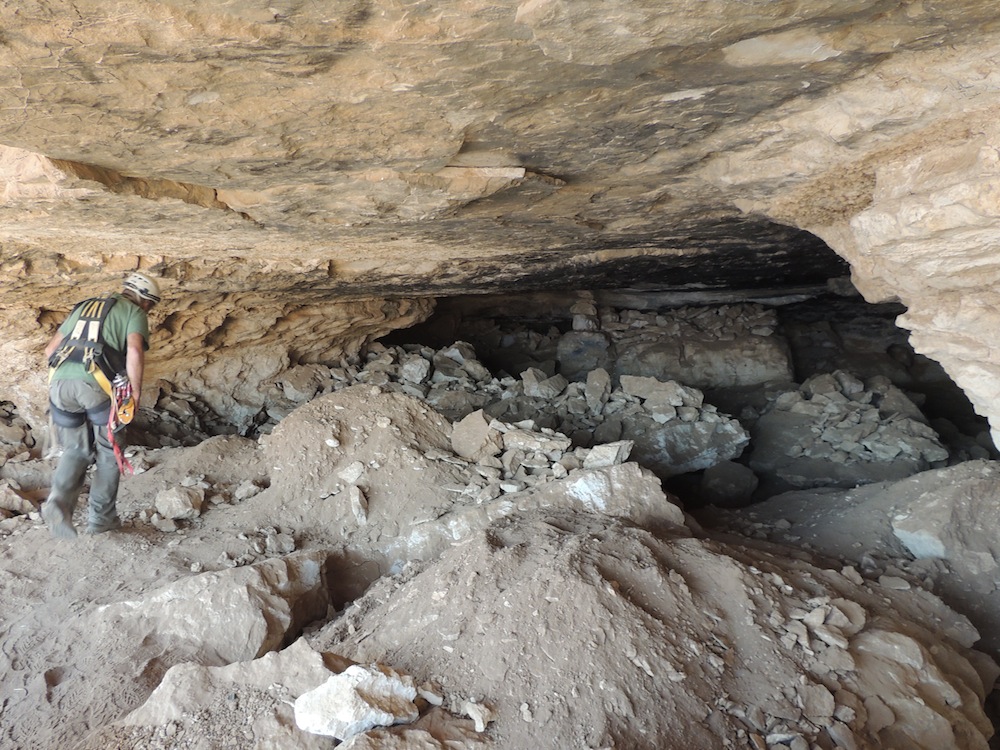
A band of antiquities thieves were sentenced to 18 months in prison after being caught red-handed looting an ancient cave in Israel.
The six thieves were caught plundering the 2,000-year-old archaeological site known as the "Cave of the Skulls." In the process, they destroyed some of the cliffside where the cave was located.
The six men, all members of the same family, "worked as an organized team of professional criminals who are experts in this field, who collected information and planned meticulously before coming to perpetrate the crimes," according to the ruling statement from the Be'er Sheva Magistrate's Court, which sentenced the men on June 4.
The looters pled guilty to damaging an ancient site, excavating an ancient site without a permit, conspiring to commit a crime, and unlawfully residing in Israel, according to a statement from the Israel Antiquities Authority. They were sentenced to 18 months in prison and slapped with a 12,000-shekel ($3,139) fine. [The Holy Land: 7 Amazing Archaeological Finds]
Ancient site
The Cave of the Skulls is embedded in a steep cliff overlooking the valley of Nahal Ze'elim, not far from the Dead Sea. The only way to get to the site on foot is to navigate a narrow gazelle path that winds around a slope strewn with loose stones. Ancient peoples occupied the sites in two different periods — during the Chalcolithic period, about 6,000 years ago, and during the Roman period, about 2,000 years ago.
In November 2014, members of a search-and-rescue team were training on the cliffs when they noticed a suspicious movement near the caves. They notified inspectors from the Israel Antiquities Authority, who then conducted a stakeout. That stakeout turned up six looters; the authorities apprehended the men as they were climbing back up the cliff face toward their car at the top. They were carrying several stolen artifacts from the site, most notably a wooden lice comb from the Roman period.
Sign up for the Live Science daily newsletter now
Get the world’s most fascinating discoveries delivered straight to your inbox.
The group was also found with ropes, digging equipment, food and a metal detector. The illicit diggers had disturbed the geological layers of the site, scattered shards of pottery and dug deep holes at the site, causing significant damage, according to the Israel Antiquities Authority.
The plunderers may have been hunting for as-yet-undiscovered texts from 2,000 years ago, inspectors speculate. The arid conditions of the Judean Desert preserve parchment and papyrus, and since the 1940s, archaeologists have unearthed many such artifacts in the region, including ancient versions of the biblical books of Genesis, Exodus and Deuteronomy.
The Dead Sea Scrolls were found in similar cliffside caves known as the Qumran Caves, located in the Judean Desert in the West Bank.
"For many years now, gangs of antiquities robbers have been operating along the Judean Desert cliffs," Amir Ganor, director of the Israel Antiquities Authority's unit for the prevention of antiquities robbery, said in a previous statement. "The robbers attempt to locate and find the Dead Sea Scrolls, pieces of ancient texts and unique artifacts that were left in the caves."
Israel's rich archaeological legacy makes it an attractive lure for would-be antiquities thieves. In April 2015, Israel police arrested a group of people on suspicion of stealing 2,000-year-old coins. In March 2014, the police seized 11 ossuaries, or bone boxes, as thieves were closing a deal to smuggle them out of the country.
Follow Tia Ghose on Twitter and Google+. Follow Live Science @livescience, Facebook & Google+. Original article on Live Science.

Tia is the managing editor and was previously a senior writer for Live Science. Her work has appeared in Scientific American, Wired.com and other outlets. She holds a master's degree in bioengineering from the University of Washington, a graduate certificate in science writing from UC Santa Cruz and a bachelor's degree in mechanical engineering from the University of Texas at Austin. Tia was part of a team at the Milwaukee Journal Sentinel that published the Empty Cradles series on preterm births, which won multiple awards, including the 2012 Casey Medal for Meritorious Journalism.









